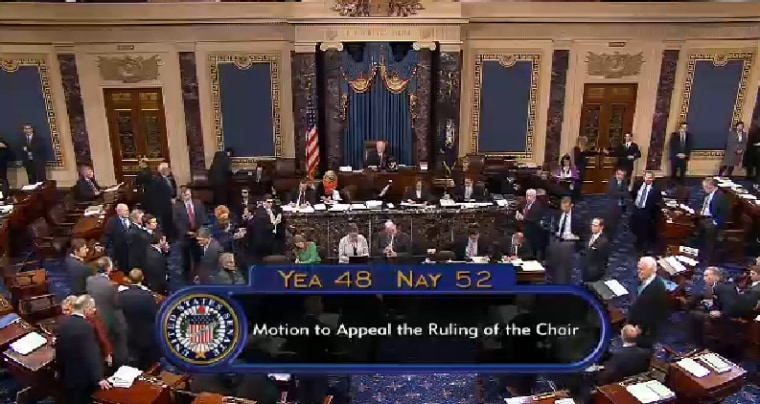
Proponents of Senate reforms could be forgiven for feeling like Charlie Brown. Changes to the Senate's filibuster rules have been promised, talked about, brought up, and debated countless times, but whenever it was time to follow through, the ball would be pulled away at the last moment.
That is, until today.
Overnight, Senate Majority Leader Harry Reid's (D-Nev.) office made clear that today would be the day for the so-called "nuclear option" -- a procedural tactic Senate Republicans came up with eight years ago, that allows members to change filibuster rules with simple majority vote. "We're not bluffing," one senior aide said.
Senate Democrats have voted to change one of the chamber's most fundamental rules, a move which majority Democrats insisted was vital to clearing up a logjam of presidential nominees due to Republican obstruction. Fifty-two Democrats voted to invoke the so-called "nuclear option" -- an unprecedented change previously threatened but not invoked until Thursday.
Three Democrats -- Michigan's Carl Levin, Arkansas' Mark Pryor, and West Virginia's Joe Manchin -- voted with the Republican minority to allow filibusters to continue. They failed on the 52-48 vote. (If you look at the roll call later, a "nay" vote was for the nuclear option -- it was a vote to overturn the ruling of the chair.)
And with this vote, effective immediately, the Senate will operate under a new precedent: judicial nominees and nominees for administration posts cannot be filibustered; confirmation votes will be majority rule. According to Democratic leaders, this preserves the option to filibuster Supreme Court nominees, though there's some disagreement on this point.
Republicans are, of course, outraged that Democrats "changed the rules." It's therefore important to realize that by executing the "nuclear option," Democrats didn't change the practices of the Senate so much as they restored the institution to its norms -- for more than 200 years, judicial and administration nominees were subjected to up-or-down votes. Now, they will be again.
In other words, the resolution of this fight is hardly radical; indeed, it's the exact opposite. The Senate, now more functional than it was yesterday, will now exercise its "advise and consent" role the way it used to -- the way it was designed to.
It's important to recognize the fact that this was a move Senate Democrats were reluctant to make, and avoided for years.
But Senate Republicans, eager to ignore election results they disagreed with, picked a dangerous fight, created a constitutional crisis, and left the majority party with no choice. As we've discussed over the course of the year, we've seen the first-ever filibuster of a cabinet nominee -- a Defense Secretary nominee during a war, no less -- and a filibuster of a CIA nominee. Republicans have filibustered judicial nominees they don't like and judicial nominees they do like. GOP senators have, for the first time, used filibusters to stop the executive branch from enforcing the law.
But it was the decision from Senate Republicans to create a blockade on all D.C. Circuit nominees that ultimately forced Democrats' hands. For the first time in American history, a Senate minority said it would block every nominee for a federal bench, regardless of the individual's qualifications, because they disapprove of the nation's choice to serve as president of the United States. It wasn't until this week that nuclear-option skeptics in the Democratic caucus decided they'd seen enough.
Republicans are accusing Democrats of having done something extraordinary, but by any fair measure, Republicans did this to themselves.